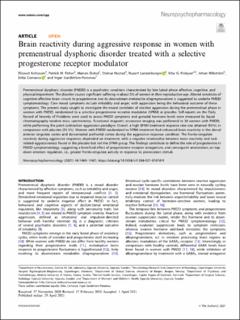| dc.contributor.author | Kaltsouni, Elisavet | |
| dc.contributor.author | Fisher, Patrick M. | |
| dc.contributor.author | Dubol, Manon | |
| dc.contributor.author | Hustad, Steinar | |
| dc.contributor.author | Lanzenberger, Rupert | |
| dc.contributor.author | Frokjaer, Vibe G. | |
| dc.contributor.author | Wikström, Johan | |
| dc.contributor.author | Comasco, Erika | |
| dc.contributor.author | Sundström-Poromaa, Inger | |
| dc.date.accessioned | 2022-04-21T08:13:23Z | |
| dc.date.available | 2022-04-21T08:13:23Z | |
| dc.date.created | 2022-01-16T17:39:10Z | |
| dc.date.issued | 2021 | |
| dc.identifier.issn | 0893-133X | |
| dc.identifier.uri | https://hdl.handle.net/11250/2991836 | |
| dc.description.abstract | Premenstrual dysphoric disorder (PMDD) is a psychiatric condition characterized by late luteal phase affective, cognitive, and physical impairment. The disorder causes significant suffering in about 5% of women in their reproductive age. Altered sensitivity of cognitive-affective brain circuits to progesterone and its downstream metabolite allopregnanolone is suggested to underlie PMDD symptomatology. Core mood symptoms include irritability and anger, with aggression being the behavioral outcome of these symptoms. The present study sought to investigate the neural correlates of reactive aggression during the premenstrual phase in women with PMDD, randomized to a selective progesterone receptor modulator (SPRM) or placebo. Self-reports on the Daily Record of Severity of Problems were used to assess PMDD symptoms and gonadal hormone levels were measured by liquid chromatography tandem mass spectrometry. Functional magnetic resonance imaging was performed in 30 women with PMDD, while performing the point subtraction aggression paradigm. Overall, a high SPRM treatment response rate was attained (93%), in comparison with placebo (53.3%). Women with PMDD randomized to SPRM treatment had enhanced brain reactivity in the dorsal anterior cingulate cortex and dorsomedial prefrontal cortex during the aggressive response condition. The fronto-cingulate reactivity during aggressive responses depended on treatment, with a negative relationship between brain reactivity and task-related aggressiveness found in the placebo but not the SPRM group. The findings contribute to define the role of progesterone in PMDD symptomatology, suggesting a beneficial effect of progesterone receptor antagonism, and consequent anovulation, on top-down emotion regulation, i.e., greater fronto-cingulate activity in response to provocation stimuli. | en_US |
| dc.language.iso | eng | en_US |
| dc.publisher | Nature | en_US |
| dc.rights | Navngivelse 4.0 Internasjonal | * |
| dc.rights.uri | http://creativecommons.org/licenses/by/4.0/deed.no | * |
| dc.title | Brain reactivity during aggressive response in women with premenstrual dysphoric disorder treated with a selective progesterone receptor modulator | en_US |
| dc.type | Journal article | en_US |
| dc.type | Peer reviewed | en_US |
| dc.description.version | publishedVersion | en_US |
| dc.rights.holder | Copyright 2021 The Author(s) | en_US |
| cristin.ispublished | true | |
| cristin.fulltext | original | |
| cristin.qualitycode | 2 | |
| dc.identifier.doi | 10.1038/s41386-021-01010-9 | |
| dc.identifier.cristin | 1982039 | |
| dc.source.journal | Neuropsychopharmacology | en_US |
| dc.source.pagenumber | 1460-1467 | en_US |
| dc.identifier.citation | Neuropsychopharmacology. 2021, 46 (8), 1460-1467. | en_US |
| dc.source.volume | 46 | en_US |
| dc.source.issue | 8 | en_US |

